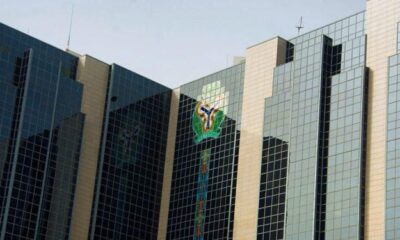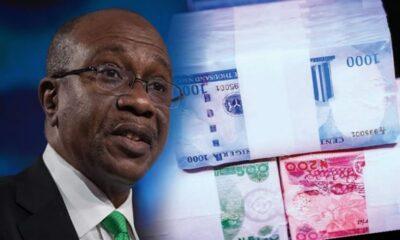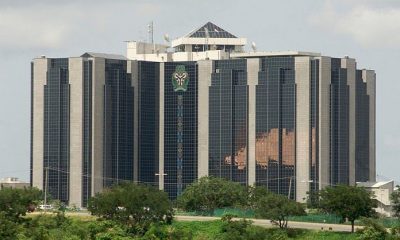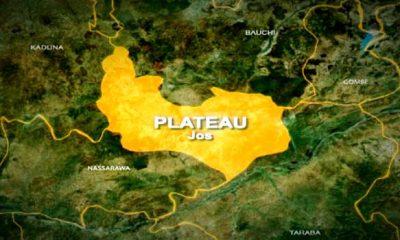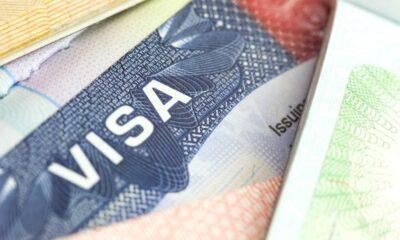Business
CBN Bans Banks From Operating PoS, Approves 17 Companies as Mobile Money, Operators In Nigeria
Published
1 year agoon
By
Editor
Due to the recent hiccups experienced by bank customers and their inability to use mobile apps and other digital touchpoints, Nigerians have begun the search for alternatives as fintech firms have taken over the ecosystem and provided better experiences.
These licensed mobile operators have provided relief to many Nigerians at the time of unprecedented transaction failures.
The mobile money operators offer incentives such as zero transfer charges and daily rewards to customers.
Many customers on these platforms are concerned about the legality of the platforms and wonder if they are authorised or licensed to operate in Nigeria.
READ ALSO: Falz Reacts To Sanwo-Olu’s appreciation Post
The worries have prompted the apex bank to draw up a list of authorised operators in the financial ecosystem.
The development comes as the CBN barred bank agents from offering PoS services.
CBN releases guidelines for PoS operations
CBN released the regulatory framework for agent banking operations, which includes several restrictions to mitigate risks in the financial sector.
The guideline was announced in a circular titled Exposure Draft of the Regulatory Framework for Agent Banking in Nigeria, signed by Musa I. Jimoh, the director of the Payments System Management Department.
In the 31-page document, the CBN dedicated Section 8.3 to outline prohibited activities for agents.
Vanguard reports that one of the key restrictions in the guideline is that agents must not use the purchase option on PoS terminals for cash-in and cash-out transactions.
The CBN has also warned agents against transactions where a receipt or acknowledgment cannot be generated. In addition to the abovementioned restrictions, the circular prohibits agents from conducting transactions in foreign currency. Agent banking is a financial inclusion service that aims to extend the reach of retail banking services to all segments of the population, especially residents of rural areas.
The service providers include First Monie, EcoBank Express, UBA Moni, Zenith Mobile Money, and others.
The CBN has observed that the agent banking initiative has led to the proliferation of financial service agents across Nigeria.
READ ALSO: Police Arraign PoS Operator For Alleged N891,000 Fraud
Reports say a significant and growing portion of financial transactions is now conducted through agents.
Approved mobile money operators
Abeg Technologies Limited
Chams Mobile Limited
eTranzact International Limited
Fortis Mobile Money Limited
Funds And Electronic Transfer (FETS)
Limited Hedonmark Management Services Limited
Pagatech Limited
Palmpay Limited
Parkway Projects Limited
Teasy International Company Limited
Nanonow Digital Services Limited
VTNetwork Limited
Xpress MTS Limited
Kongapay Technologies Limited
Visual ICT Limited
You may like


CBN Sells Fresh Dollars To BDCs At N1,021/$


CBN Gives New Directive On Lending In Real Estate


How I Collected Dollars In Cash For Emefiele, Dispatch Rider Tells Court


JUST IN: CBN Sells FX To BDCs At N1,101/$1


JUST IN: CBN Gov Sacks Eight Directors, 32 Others


BREAKING: Jim Obazee Concludes CBN Probe, Submits Report To Tinubu

The Central Bank of Nigeria (CBN) started fresh and direct sales of US dollars at N1,021 per dollar to Bureau De Change operators.
Nigeria’s apex bank disclosed this in a circular signed by its Director of Trade and Exchange Department Hassan Mahmud.
“We write to inform you of the sale of $10,000 by the Central Bank of Nigeria (CBN) to BDCs at the rate of N1,021/$1. The BDCs are in turn to sell to eligible end users at a spread of NOT MORE THAN 1.5 percent above the purchase price,” the circular posted on its website read.
READ ALSO: Tinubu Unveils African Counter-Terrorism Summit
“ALL eligible BDCs are therefore directed to commence payment of the Naira deposit to the underlisted CBN Naira Deposit Account Numbers from today, Monday, April 22, 2024, and submit confirmation of payment, with other necessary documentations, for disbursement of FX at the respective CBN Branches.”
CBN’s move is coming as the naira is recording a slight depreciation against the dollar after weeks of gains.
In late March, the bank also sold $10,000 to each of the eligible Bureau De Change (BDC) operators in the country at the rate of N1,251/$1.
READ ALSO: Mixed Reactions Trail Video Of Couple’s Customised N200 Notes
Like in the most recent sales, it warned BDCs against breaching terms of the dollar sales, vowing to sanction defaulters “including outright suspension from further participation in the sale”.
The fortunes of the naira have fallen sharply since President Bola Tinubu took over in May. Inflation figures have reached new highs and the cost of living hitting the rooftops.
Nigeria’s currency slid to about N1,900/$ some months ago at the parallel market. But in recent weeks, it has gained against the dollar.
The Nigerian authorities have also doubled down on their crackdown against cryptocurrency platform Binance and illegal BDCs.
On March 1, the CBN revoked the licences of 4,173 BDCs over compliance failures.

Olusegun Alebiosu has been appointed as the Acting Managing Director/Chief Executive Officer of First Bank of Nigeria Limited (FirstBank Group), effective April 2024.
Alebiosu steps into this pivotal role from his previous position as the Executive Director, Chief Risk Officer, and Executive Compliance Officer, a position he held since January 2022.
Alebiosu brings to the helm of FirstBank over 28 years of extensive experience in the banking and financial services industry. His expertise spans various domains including credit risk management, financial planning and control, corporate and commercial banking, agriculture financing, oil and gas, transportation, and project financing.
READ ALSO: JUST IN: Access Holdings Names New Acting CEO
Having embarked on his professional journey in 1991 with Oceanic Bank Plc. (now EcoBank Plc.), Alebiosu has held several notable positions in esteemed financial institutions.
Prior to joining FirstBank in 2016, he served as Chief Risk Officer at Coronation Merchant Bank Limited, Chief Credit Risk Officer at the African Development Bank Group, and Group Head of Credit Policy & Deputy Chief Credit Risk Officer at United Bank for Africa Plc.
Alebiosu’s academic credentials further enrich his professional profile. He is an alumnus of the Harvard School of Government and holds a Bachelor’s degree in Industrial Relations and Personnel Management. Additionally, he obtained a Master’s degree in International Law and Diplomacy from the University of Lagos, as well as a Master’s degree in Development Studies from the London School of Economics and Political Science.
READ ALSO: Meet Newly Appointed Union Bank CEO
A distinguished member of various professional bodies, including the Institute of Chartered Accountants (FCA), Nigeria Institute of Management (ANIM), and Chartered Institute of Bankers of Nigeria (CIBN), Alebiosu is renowned for his commitment to excellence and ethical practices in the banking sector.
Beyond his professional endeavors, Alebiosu is known for his passion for golf and adventure. He is happily married and a proud parent.
With Alebiosu’s appointment, FirstBank of Nigeria Limited anticipates continued growth and innovation under his leadership, reinforcing its position as a leading financial institution in Nigeria and beyond.
Business
CBN Gives New Directive On Lending In Real Estate
Published
7 days agoon
April 17, 2024By
Editor
The Central Bank of Nigeria, CBN, has released a new regulatory directive to enhance lending to the real sector of the Nigerian economy.
The directive, issued on April 17, 2024, with reference number BSD/DIR/PUB/LAB/017/005 and signed by the Acting Director of Banking Supervision, Adetona Adedeji, signifies a notable shift in the bank’s policy towards a more contractionary approach.
In line with the new measures, the CBN has reduced the loan-to-deposit ratio by 15 percentage points, down to 50 per cent.
This move aligns with the CBN’s current monetary tightening policies and reflects the increase in the Cash Reserve ratio rate for banks.
READ ALSO: JUST IN: CBN Gov Sacks Eight Directors, 32 Others
The LDR is a metric used to evaluate a bank’s liquidity by comparing its total loans to its total deposits over the same period, expressed as a percentage.
An excessively high ratio may indicate insufficient liquidity to meet unexpected fund requirements.
All Deposit Money Banks are now mandated to adhere to this revised LDR.
The CBN has stated that average daily figures will be utilised to gauge compliance with this directive.
Furthermore, while DMBs are encouraged to maintain robust risk management practices in their lending activities, the CBN has committed to continuous monitoring of adherence and will adjust the LDR as necessary based on market developments.
READ ALSO: JUST IN: CBN Increases Interest Rate To 24.75%
Adedeji has called on all banks to acknowledge these modifications and adjust their operations accordingly. He emphasised that this regulatory adjustment is anticipated to significantly influence the banking sector and the wider Nigerian economy.
The circular read in part, “Following a shift in the Bank’s policy stance towards a more contractionary approach, it is crucial to revise the loan-to-deposit ratio policy to conform with the CBN’s ongoing monetary tightening.
“Consequently, the CBN has decided to decrease the LDR by 15 percentage points to 50 per cent, proportionate to the rise in the CRR rate for banks.
“All DMBs must maintain this level, and it is advised that average daily figures will still be applied for compliance assessment.
“While DMBs are urged to sustain strong risk management practices concerning their lending operations, the CBN will persist in monitoring compliance, reviewing market developments, and making necessary adjustments to the LDR. Please be guided accordingly.”

How Yahaya Bello Moved $720,000 From State Coffers To Pay Child’s School Fees — EFCC

Nollywood Actor, Zulu Adigwe Is Dead

Meet 17-year-old Nigerian Who Won $3.5m Worth Of Scholarships From Harvard, 13 Other Foreign Universities
Trending

 Entertainment2 days ago
Entertainment2 days agoBridesmaids’ Dance At Wedding Causes Stir On Social Media [VIDEO/PHOTOS]

 Politics3 days ago
Politics3 days agoEdo Guber: Akoko-Edo PDP Leaders Meet In Igara, Describe Ighodalo, Ogie As ‘Perfect Match’

 Metro2 days ago
Metro2 days agoVIDEO: ‘UNN Lecturer’ Caught Pants Down With Married Student

 News4 days ago
News4 days agoFoundation Advocates Empowerment Of Women, Youth In Nigeria

 Headline5 days ago
Headline5 days agoBest Airports In Africa For 2024 Named, Nigeria Missing [Full List]

 Metro5 days ago
Metro5 days agoBREAKING: Protests As Gunmen Kill 12 In Plateau Village

 News3 days ago
News3 days agoOutrage As Chinese Supermarket In Abuja Denies Nigerians Entry

 News5 days ago
News5 days agoJUST IN: Tinubu Appoints SEC Chairman, Board Members

 News4 days ago
News4 days agoWhy Police Detained Yahaya Bello’s ADC, Security Details Revelead

 News4 days ago
News4 days agoJapa: Types Of US Visa Available To Nigerians, Other Foreigners


